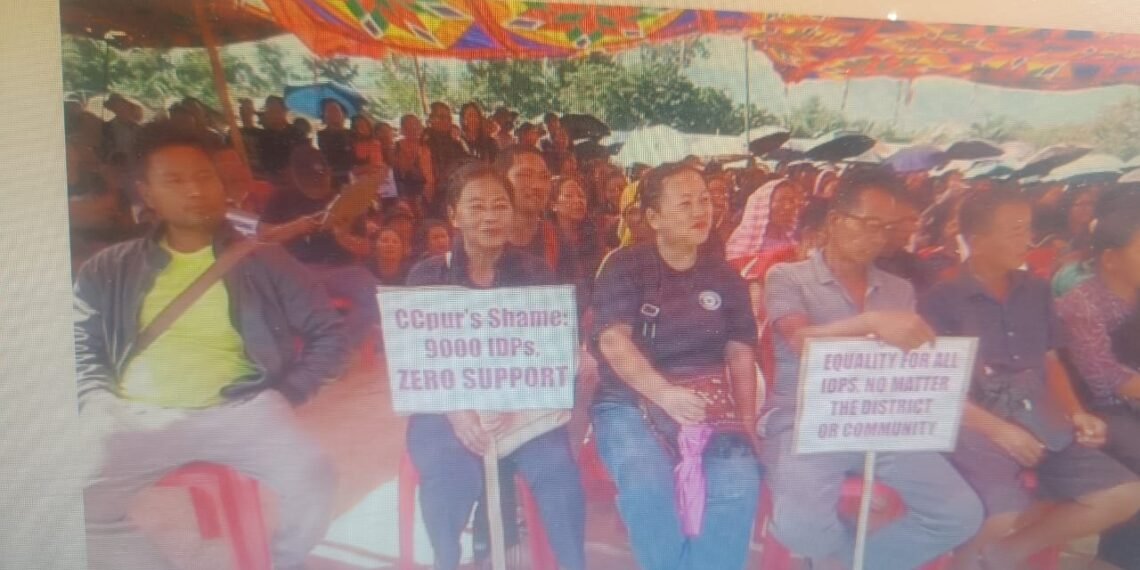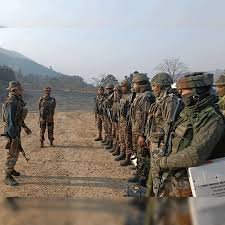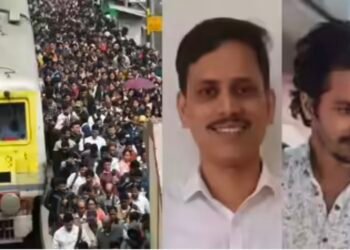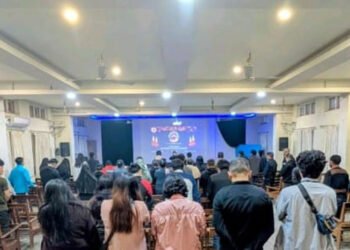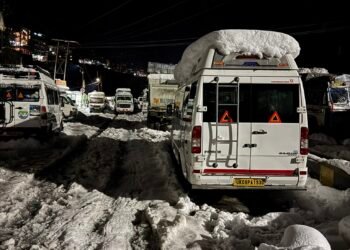Carrying placards denouncing “administrative bias” and “unequal relief distribution,” the IDPs — both camped and non-camped — called for transparency in compensation and humane rehabilitation policies.
BY PC Bureau
November 3, 2025: Anger and anguish found powerful expression in Churachandpur today as thousands of internally displaced persons (IDPs) — both from government relief camps and temporary shelters — converged at Tuibong Peace Ground to demand justice, equal treatment, and accountability from the Manipur government.
Under the banner of the Joint Internally Displaced Persons (IDPs) Churachandpur, the demonstrators denounced what they described as “systematic neglect, blatant disparity, and administrative indifference” in the delivery of relief and compensation.
The unprecedented show of unity — described by local observers as one of the most forceful public assertions by displaced families since the conflict began in May 2023 — brought together victims from multiple tribal communities still struggling to rebuild their shattered lives.
The gathering was addressed by Dr. R. Sanga, convenor of the Joint IDPs Churachandpur Committee, along with Dr. Vumkhoneh and Dr. John Pulamte, who called for transparency, equality, and humane rehabilitation. After the speeches, the displaced families carried out a peaceful march through Churachandpur town, before submitting a detailed memorandum to the Governor of Manipur through the district administration.
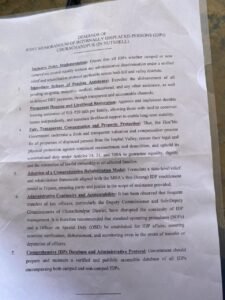
Placards held high by the rallying IDPs captured the collective mood of frustration and resolve:
“We Reject Differentiation of IDPs – Camped and Non-Camped,”
“CCpur’s Shame: 9000 IDPs Zero Support,”
“Implement Relief Protocol in Toto,”
“CCpur’s IDPs Punished by DC and Biren,” and
“Compensation Based on Value, Not Fixed — No Closure Without Settlement.”
READ: #RIPTVJournalism: Dharmendra Is Alive and Recovering
READ: DNA Test Key to Confirm Identity of Red Fort Blast Suspect Dr. Umar U Nabi
A Call for Justice and Equality
The Joint Memorandum. representing Hmar, Thadou-Kuki, Mizo, Vaiphei, and Zomi communities,was submitted to the Governor for urgent humanitarian and administrative action. The memorandum opens with an appeal grounded in the Constitutional guarantees of justice, equality, and dignity, invoking Articles 21, 38, and 39A.
“For over two years,” it states, “thousands of displaced men, women, and children have lived in uncertainty, uprooted from ancestral homes, cut off from livelihoods, and left to survive on goodwill. Yet, despite immense hardship, we continue to hold faith in the Constitution of India and the promise of humane governance.”
The document highlights what it calls a “two-year-long humanitarian paralysis”, with the displaced population — estimated between 25,000 and 30,000 persons — facing uneven and inconsistent relief measures. About 15,000 remain in relief camps, while others are scattered across rented houses, churches, and relatives’ homes.
Core Demands and Legal Arguments
The memorandum lays out nine key concerns and demands, supported by legal and constitutional arguments:
- Equal Treatment for Camped and Non-Camped IDPs
The IDPs demanded an end to what they described as “arbitrary administrative discrimination” between camp and non-camp residents. They cited the UN Guiding Principles on Internal Displacement, emphasizing that IDPs are defined by displacement — not by their place of residence.
“Both groups suffered identical loss and trauma,” the memorandum notes, calling the State’s current classification “arbitrary and unconstitutional.”
- Immediate Relief and Pending Assistance
The petitioners demanded prompt disbursement of pending ex-gratia payments, maternity and medical aid, and student support, urging that all benefits be routed through Direct Benefit Transfer (DBT) with a dedicated Grievance Redressal Cell under the Deputy Commissioner to ensure accountability.
- Permanent Housing Before Camp Closure
With the State planning to close relief camps by December 2025, the memorandum warns against eviction without resettlement, calling it a violation of Article 21 (Right to Life and Dignity).
It cites landmark Supreme Court rulings — Olga Tellis (1985), Chameli Singh (1996), and P.K. Koul (2011) — affirming housing as a constitutional right, and demands a ₹15–₹20 lakh housing assistance package per family.
“No eviction or camp closure should take place until permanent housing is ensured,” it declares.
- Inclusion of All IDPs in DBT Framework
While welcoming the October 24, 2025 notification shifting to cash transfers, the IDPs condemned the exclusion of non-camped families. They also termed the ₹84 per person per day rate “grossly inadequate,” urging revision and parity with the Bru (Reang) rehabilitation model implemented in Tripura.
- Fair Land Valuation and Property Protection (Imphal Valley)
The memorandum documents continuing encroachment and vandalism of abandoned tribal properties in the Imphal Valley.
It calls for fresh, transparent compensation assessments aligned with current market rates and legal safeguards under Articles 14, 21, and 300A, stressing the constitutional duty of the State to restore ownership and dignity.
- Reference to the MHA’s Bru (Reang) Rehabilitation Model
The IDPs urged the Manipur Government to emulate the ₹821-crore Bru (Reang) Resettlement Package, which provided housing, financial security, and amenities — a precedent for “humane and comprehensive rehabilitation.”
- Pending Interim Relief and Household Kits
The petition alleges that the ₹1 lakh interim relief and ₹70,000 household kits promised under the Home Department’s September 8, 2023 notification have been disbursed in valley districts but denied to Churachandpur’s tribal IDPs, terming it “administrative discrimination.”
- Creation of a Verified IDP Database
They demanded a transparent, block-wise IDP database — covering both camped and non-camped populations — and the establishment of standard operating procedures (SOPs) to prevent exclusion and ensure administrative continuity despite frequent transfers of district officers.
Final Recommendations
The memorandum concludes with six key appeals to the Governor:
- Inclusive Policy Implementation: Equal treatment for all IDPs across hill and valley districts.
- Immediate Disbursement of Pending Assistance.
- Permanent Housing and Livelihood Restoration.
- Transparent Property Valuation and Protection.
- Adoption of a Comprehensive Rehabilitation Framework (on the lines of the Bru model).
- Administrative Continuity and Accountability.
As the crowd dispersed after submitting the memorandum, chants of “We want justice, not neglect” echoed through Churachandpur’s streets — a reminder that, for Manipur’s displaced citizens, the demand is not just for relief, but for recognition and equal citizenship.



